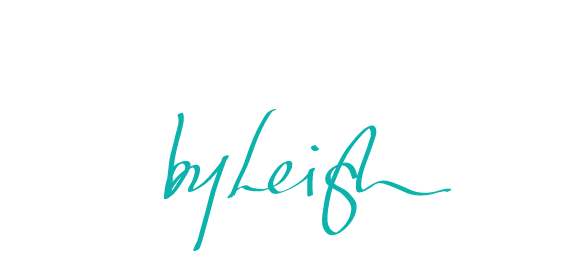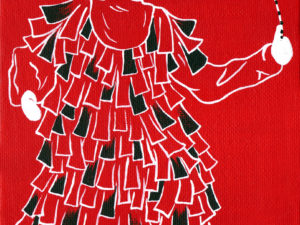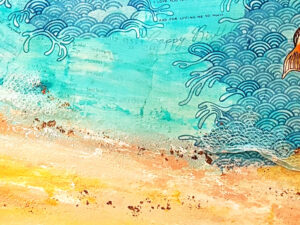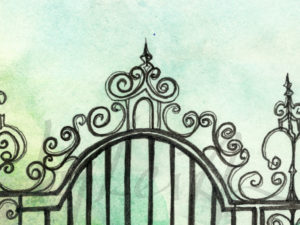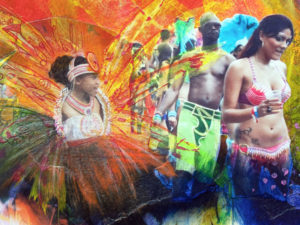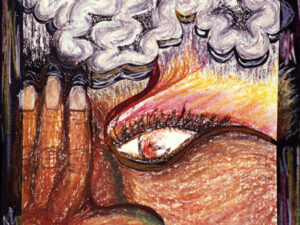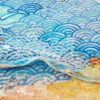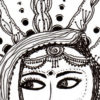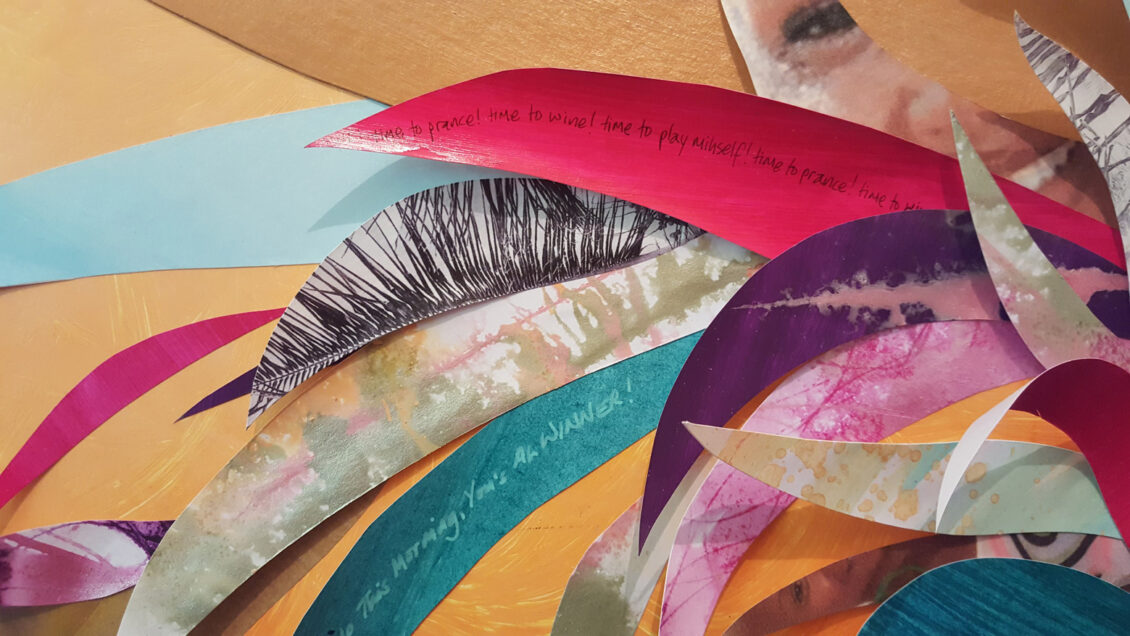
Featured Image: Close up of Play Mihself, Life Story Art by Leigh
16 Feb 2019
I’ve been devouring Teaching to Transgress[i] via audiobook then flitting to my hardcopy[ii] to apply post-it notes to the areas that interest me so much that not even an audio bookmark feels like enough. The chapter on Essentialism & Experience started and immediately I was torn between a perpetual comedy wince and confusion.
The comedy wince was because Bell was laying into Diana Fuss with the gusto that Caribbean children of my generation imagine a whipping from a bull pistle[iii] would require! Fuss had obviously committed grievous sins against black feminism, and given the clear way Hooks[iv] outlines her evidence and arguments, I’d be interested to see how Fuss explains what appears to be a complete lack of self-analysis and a whole lot of unconscious bias hanging out for all who have eyes to see.
My confusion stems from Fuss’ argument that experience (used in an essentialist manner) can be disruptive to the classroom and shut down discussion. I am probably being very naïve when I ask why someone’s personal experience wouldn’t raise more discussion, more investigation and exploration? Isn’t this what any teacher worth their title wants in their classroom?
If I think of teaching as performance art (and indeed we can discuss this metaphor in a minute), then as Monica Vilhauer states in her book Gadamer’s Ethics of Play[v], “it is only [through] the back and forth play of communicating meaning between presenter and spectator that interpretive understanding occurs and the artwork achieves its completion” (Vilhauer, 2010, p. 31). In this way, the opportunity for discussion based on the experience raised by the student becomes the perfect opportunity for learning.
Let me explain.
I acknowledge that sometimes people cite an experience as a means of shutting up the other person in an argument/debate/discussion but as teachers surely this gives us a tool to pivot the discussion towards our learning outcome? – Whoa! What an experience! This is a great opportunity for all of us to dig a bit deeper. How often does this happen? To how many people? Where? Why? What are the outcomes of it happening? – This doesn’t discount the student’s personal experience, but it also doesn’t allow one person’s experience to speak for a larger group without some substantiation.
The performance art I mentioned above is how the teacher guides students towards deeper play, deeper interaction with each other through disagreement, respectful discussion and committed investigation of an idea. As everyone begins researching, citing evidence, poring over similar or opposing experiences, theorising and debating the possible causes and outcomes of these experiences, they are learning. How absolutely brilliant would that discussion be! Yes, this takes more time, they will likely need to come back to discuss after conducting their research, but the classroom would come alive with learning.
And this is precisely what Vilhauer is talking about when she explains Gadamer’s definition of play as a “dance of mutual responsiveness” (Vilhauer, 2010, p. 32) between players who have committed to “the intentional self-restraint that goes along with any effort to accomplish something, do something, play something” (Vilhauer, 2010, p. 34). Teacher and students have committed to teach and to learn (and in strong learning communities – be respectful of each other) and it is the experience of playing, that back and forth interaction, that changes the person who experiences it. Vilhauer sums this up nicely.
“It is in performing the tasks that we set for ourselves in play that we present the subject matter of play. But furthermore, Gadamer tells us that it is in performing the tasks of play that we also present ourselves. In play, the human being “plays himself out”… our being-present or being-here is intimately wrapped up with being-a-participant inside some world, some community with others in which we attend to the presentation of something beyond ourselves, that is, the subject matter of our worldly experience.” (Vilhauer, 2010, p. 34-35)
When the dust settles, students would have a grasp of the topic in question way beyond what any impersonal lesson could accomplish and the person whose experience sparked the entire thing would hopefully feel like their experience was not dismissed, it was in fact taken into consideration and led to a great learning experience for everyone.
Admittedly (having jut re-read the top of this post), I must confess this is an ideal scenario where students and teachers have the time to digress a bit, explore further. Since a lot of Higher Education is now marketed as a commodity in the ‘free’ market[vi] (what I like to call the commercial sausage machine churning out graduates), it’s highly likely that opportunities to run my little ‘experiment’ would be few and far between.
Which brings me neatly to my favourite bit of this chapter. Hooks discusses why any student might feel the need to use the battering ram of experience to silence their opposition, and her insight is brilliant! Boy does Fuss get another bull pistle lash here. What Hooks doesn’t explicitly say but very heavily infers is that Fuss, blinded by her privilege, is creating the very classroom environment she laments.
“…the assertion of an excluding essentialism on the part of students from marginalized groups can be a strategic response to domination and to colonization, a survival strategy that may indeed inhibit discussion even as it rescues those students from negation.” (Hooks, 1994, p83)
And I love the strategy she poses for creating a learning environment that circumvents the need for any student to use experience as a megaphone to be heard.
“…pedagogical practices that affirm their presence, their right to speak, in multiple ways on diverse topics. This pedagogical strategy is rooted in the assumption that we all bring to the classroom experiential knowledge, that this knowledge can indeed enhance our learning experience. If experience is already invoked in class as a way of knowing that coexists in a non-hierarchical way with other ways of knowing, then it lessens the possibility that it can be used to silence.” (Hooks, 1994, p83)
How awesome is that!
Thinking about my own pedagogical practices. I do indeed bring experience and personal stories to the classroom and students love it, they connect with me and the lesson more. I love sharing myself with my students in this way. Yet, I wholly accept that I rely too heavily on experience and need to solidify my approach in more theory. At times, I find myself dangerously close to experience tending towards essentialism. Reading Hooks’ dissection of Fuss, it feels like the most effective approach is to allow everyone to utilise experience as a personal element that connects the learning community, but to query the essentialist aspect that suggests one person’s experience is representative of anyone but that person. Giroux[vii] might have said it best – “the notion of experience has to be situated within a theory of learning” (Giroux, 1992, p. 17).
I better go finish reading Hooks and Vilhauer. Lots to learn!
[i] Hooks, B (1994) Teaching to Transgress: Education as the Practice of Freedom. Available at: https://www.audible.co.uk/ (Downloaded: 26 January 2019).
[ii] Hooks, B (1994) Teaching to Transgress: Education as the Practice of Freedom. London: Routledge.
[iii] A bull pistle is “a tough, long whip made from the penis of a bull… used as a flogging instrument”. Caribbean grandparents often threatened to flog with a bull pistle for major childhood misdemeanours, however few people of my generation have ever actually seen a bull pistle or know anyone who has. The mention of a bull pistle was more an indication of how angry they were with you and/or the enormity of your transgression. Formal definition sourced from Allsop, R., Allsop, J. (eds) (2003) Dictionary of Caribbean English Usage. Jamaica: The University of the West Indies Press by arrangement with Oxford University Press.
[iv] Can we talk about how I feel so connected to this author that I struggle to use her surname when referencing and keep referring to her as Bell like she’s my friend. I mean no disrespect Ms Hooks, I’m just completely enamoured with how accessible you make theory.
[v] Vilhauer, M. (2010) Gadamer’s Ethics of Play: Hermeneutics and the Other. Plymouth: Lexington Books, Chp 3.
[vi] Holmwood, J. (2018) Race and the Neoliberal University: Lessons from the Public University, in Bhambra, K. Gebrial, D. & Nisancioglu, K. (eds). Decolonising the University. London: Pluto Press, p. 37-47
[vii] Giroux, H. (1992) Border Crossings: Cultural Workers and the Politics of Education. London: Routledge.
